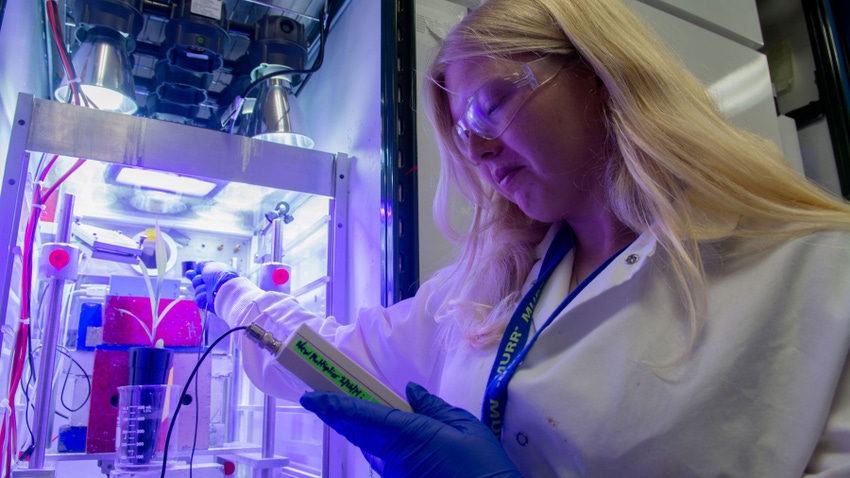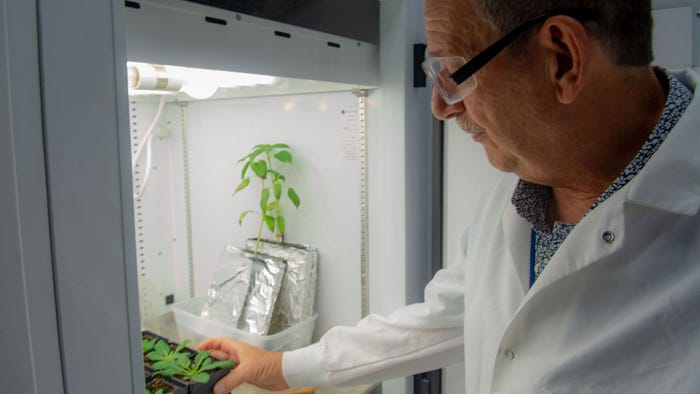January 24, 2023

Richard Ferrieri never thought a simple bottle of liquid smoke would change the trajectory of his team’s research. But the popular food additive may one day improve the health of food crops.
Ferrieri, a research professor in the University of Missouri Department of Chemistry and investigator at the University of Missouri Research Reactor (MURR), and his team originally focused on studying how soil saturated by the intense smoke caused by wildfires alters plant growth. But when the team added liquid smoke to the soil where the plant grew, the researchers found it could enhance the plant’s natural defenses and increase its ability to resist pests and diseases.
Liquid smoke, created by condensing smoke from burning wood, provided a simulation — in a laboratory setting — of the smoky conditions created by a wildfire.
“Plants can’t run away when they are trying to defend themselves from an active threat,” explains Ferrieri, who is also a member of the Interdisciplinary Plant Group at MU. “Therefore, it takes a lot of energy for a plant to dedicate precious resources it would normally dedicate to its growth to now defend itself. Much like the human body, a key to plant health lies in how well its vascular system can function under stress and move precious resources to the different growing parts.”
Start with sunflowers
In this study, scientists used the radioisotope carbon-11 — created by a cyclotron at MURR — to help them trace how smoke affects a sunflower’s vascular system, or the system that transports carbon, water and micronutrients throughout the plant. They found that sunflowers grown in soil treated with liquid smoke had larger, thicker and greener leaves — and appeared less prone to pests and disease.

NATURAL PESTICIDE: Richard Ferrieri, a research professor and investigator at the University of Missouri Research Reactor, found liquid smoke added to the soil where a plant is growing could enhance the plant’s natural defenses and increase its ability to resist pests and diseases.
“Plants harness the energy of the sun, fix carbon dioxide and make sugars that are transported throughout the plant using their vascular system,” Ferrieri says. “By feeding carbon dioxide gas containing carbon-11 to a common domesticated variety of sunflower, we were able to create a physical map of where the sugars go using radiographic imaging. This allowed us to evaluate the effects of smoke on vascular transport.”
Switch to soybeans
In the future, Ferrieri wants to test agriculture crops, such as soybeans. He notes that soybeans could be a natural extension of existing research because they share a similar type of vascular system with sunflowers and are also susceptible to developing various diseases.
“Leaf blight is a soybean disease caused by a certain type of bacteria,” Ferrieri says. “These bacteria can winter over when crops are tilled back into the soil, leaving next season’s crops susceptible to the same blight. What we want to do is determine whether a treatment of the soil with liquid smoke could potentially protect the plants from this blight and other pathogens.”
Ferrieri hopes his lab’s work will help provide a possible solution for the issue of global food security by providing a natural alternative to the use of pesticides to help farmers increase the resilience of their crops against developing various diseases. Ultimately, he adds, this approach could potentially help increase the amount a farmer is able to grow of a particular crop.
“Treatments with liquid smoke and certain chemical constituents prevalent in smoke reduce phloem vascular sectoriality in the sunflower with improvement to growth,” was published in the International Journal of Molecular Sciences. Randi Noel, Mary Benoit, Stacy Wilder, Spenser Waller and Michael Schueller at MU also contributed to the study.
Source: University of Missouri
You May Also Like




